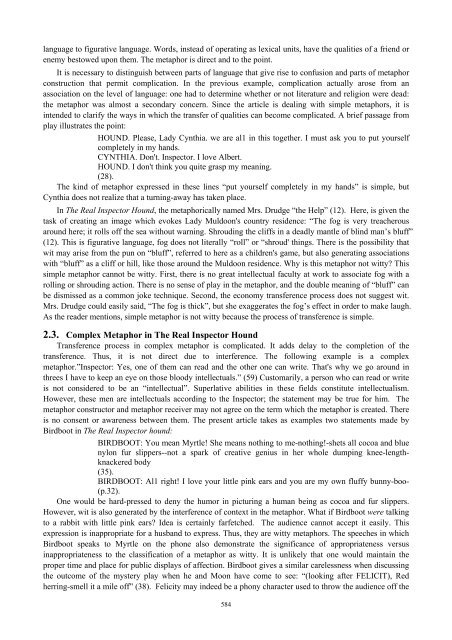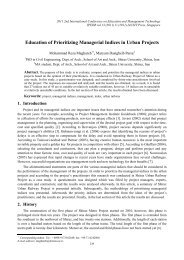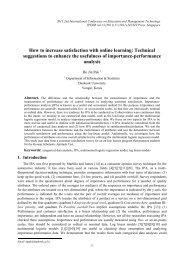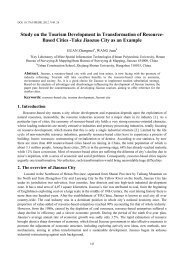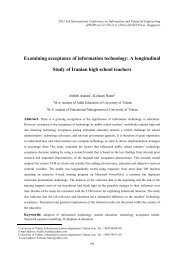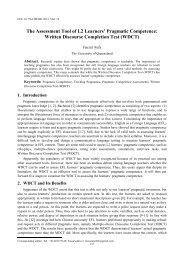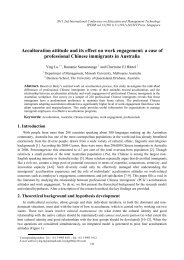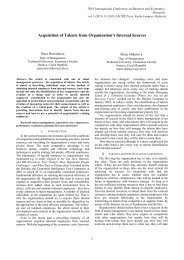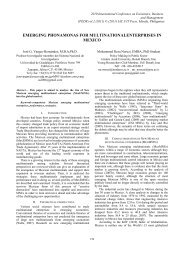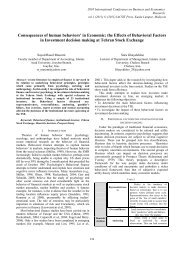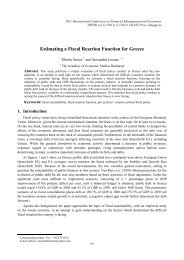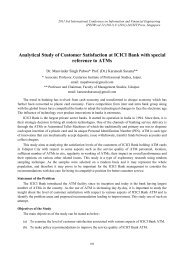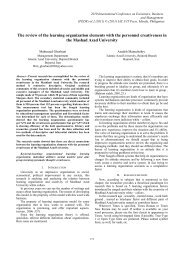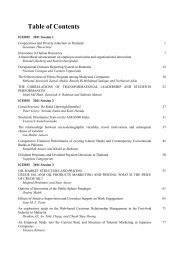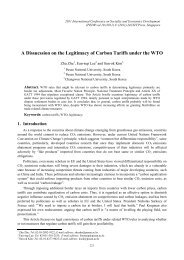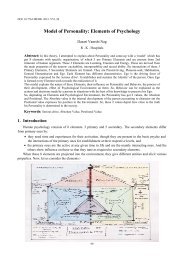The Role of Language and Its Analysis in Tom Stoppard's ... - ipedr
The Role of Language and Its Analysis in Tom Stoppard's ... - ipedr
The Role of Language and Its Analysis in Tom Stoppard's ... - ipedr
Create successful ePaper yourself
Turn your PDF publications into a flip-book with our unique Google optimized e-Paper software.
language to figurative language. Words, <strong>in</strong>stead <strong>of</strong> operat<strong>in</strong>g as lexical units, have the qualities <strong>of</strong> a friend or<br />
enemy bestowed upon them. <strong>The</strong> metaphor is direct <strong>and</strong> to the po<strong>in</strong>t.<br />
It is necessary to dist<strong>in</strong>guish between parts <strong>of</strong> language that give rise to confusion <strong>and</strong> parts <strong>of</strong> metaphor<br />
construction that permit complication. In the previous example, complication actually arose from an<br />
association on the level <strong>of</strong> language: one had to determ<strong>in</strong>e whether or not literature <strong>and</strong> religion were dead:<br />
the metaphor was almost a secondary concern. S<strong>in</strong>ce the article is deal<strong>in</strong>g with simple metaphors, it is<br />
<strong>in</strong>tended to clarify the ways <strong>in</strong> which the transfer <strong>of</strong> qualities can become complicated. A brief passage from<br />
play illustrates the po<strong>in</strong>t:<br />
HOUND. Please, Lady Cynthia. we are al1 <strong>in</strong> this together. I must ask you to put yourself<br />
completely <strong>in</strong> my h<strong>and</strong>s.<br />
CYNTHIA. Don't. Inspector. I love Albert.<br />
HOUND. I don't th<strong>in</strong>k you quite grasp my mean<strong>in</strong>g.<br />
(28).<br />
<strong>The</strong> k<strong>in</strong>d <strong>of</strong> metaphor expressed <strong>in</strong> these l<strong>in</strong>es “put yourself completely <strong>in</strong> my h<strong>and</strong>s” is simple, but<br />
Cynthia does not realize that a turn<strong>in</strong>g-away has taken place.<br />
In <strong>The</strong> Real Inspector Hound, the metaphorically named Mrs. Drudge “the Help” (12). Here, is given the<br />
task <strong>of</strong> creat<strong>in</strong>g an image which evokes Lady Muldoon's country residence: “<strong>The</strong> fog is very treacherous<br />
around here; it rolls <strong>of</strong>f the sea without warn<strong>in</strong>g. Shroud<strong>in</strong>g the cliffs <strong>in</strong> a deadly mantle <strong>of</strong> bl<strong>in</strong>d man’s bluff”<br />
(12). This is figurative language, fog does not literally “roll” or “shroud' th<strong>in</strong>gs. <strong>The</strong>re is the possibility that<br />
wit may arise from the pun on “bluff”, referred to here as a children's game, but also generat<strong>in</strong>g associations<br />
with “bluff” as a cliff or hill, like those around the Muldoon residence. Why is this metaphor not witty? This<br />
simple metaphor cannot be witty. First, there is no great <strong>in</strong>tellectual faculty at work to associate fog with a<br />
roll<strong>in</strong>g or shroud<strong>in</strong>g action. <strong>The</strong>re is no sense <strong>of</strong> play <strong>in</strong> the metaphor, <strong>and</strong> the double mean<strong>in</strong>g <strong>of</strong> “bluff” can<br />
be dismissed as a common joke technique. Second, the economy transference process does not suggest wit.<br />
Mrs. Drudge could easily said, “<strong>The</strong> fog is thick”, but she exaggerates the fog’s effect <strong>in</strong> order to make laugh.<br />
As the reader mentions, simple metaphor is not witty because the process <strong>of</strong> transference is simple.<br />
2.3. Complex Metaphor <strong>in</strong> <strong>The</strong> Real Inspector Hound<br />
Transference process <strong>in</strong> complex metaphor is complicated. It adds delay to the completion <strong>of</strong> the<br />
transference. Thus, it is not direct due to <strong>in</strong>terference. <strong>The</strong> follow<strong>in</strong>g example is a complex<br />
metaphor.”Inspector: Yes, one <strong>of</strong> them can read <strong>and</strong> the other one can write. That's why we go around <strong>in</strong><br />
threes I have to keep an eye on those bloody <strong>in</strong>tellectuals.” (59) Customarily, a person who can read or write<br />
is not considered to be an “<strong>in</strong>tellectual”. Superlative abilities <strong>in</strong> these fields constitute <strong>in</strong>tellectualism.<br />
However, these men are <strong>in</strong>tellectuals accord<strong>in</strong>g to the Inspector; the statement may be true for him. <strong>The</strong><br />
metaphor constructor <strong>and</strong> metaphor receiver may not agree on the term which the metaphor is created. <strong>The</strong>re<br />
is no consent or awareness between them. <strong>The</strong> present article takes as examples two statements made by<br />
Birdboot <strong>in</strong> <strong>The</strong> Real Inspector hound:<br />
BIRDBOOT: You mean Myrtle! She means noth<strong>in</strong>g to me-noth<strong>in</strong>g!-shets all cocoa <strong>and</strong> blue<br />
nylon fur slippers--not a spark <strong>of</strong> creative genius <strong>in</strong> her whole dump<strong>in</strong>g knee-lengthknackered<br />
body<br />
(35).<br />
BIRDBOOT: Al1 right! I love your little p<strong>in</strong>k ears <strong>and</strong> you are my own fluffy bunny-boo-<br />
(p.32).<br />
One would be hard-pressed to deny the humor <strong>in</strong> pictur<strong>in</strong>g a human be<strong>in</strong>g as cocoa <strong>and</strong> fur slippers.<br />
However, wit is also generated by the <strong>in</strong>terference <strong>of</strong> context <strong>in</strong> the metaphor. What if Birdboot were talk<strong>in</strong>g<br />
to a rabbit with little p<strong>in</strong>k ears? Idea is certa<strong>in</strong>ly farfetched. <strong>The</strong> audience cannot accept it easily. This<br />
expression is <strong>in</strong>appropriate for a husb<strong>and</strong> to express. Thus, they are witty metaphors. <strong>The</strong> speeches <strong>in</strong> which<br />
Birdboot speaks to Myrtle on the phone also demonstrate the significance <strong>of</strong> appropriateness versus<br />
<strong>in</strong>appropriateness to the classification <strong>of</strong> a metaphor as witty. It is unlikely that one would ma<strong>in</strong>ta<strong>in</strong> the<br />
proper time <strong>and</strong> place for public displays <strong>of</strong> affection. Birdboot gives a similar carelessness when discuss<strong>in</strong>g<br />
the outcome <strong>of</strong> the mystery play when he <strong>and</strong> Moon have come to see: “(look<strong>in</strong>g after FELICIT), Red<br />
herr<strong>in</strong>g-smell it a mile <strong>of</strong>f” (38). Felicity may <strong>in</strong>deed be a phony character used to throw the audience <strong>of</strong>f the<br />
584


